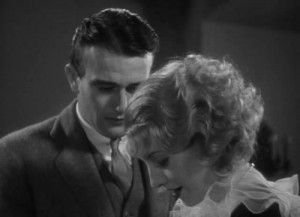The quintessential Hollywood pre-code film, “Baby Face,” released in 1933, features Barbara Stanwyck as a harried waitress named Lily Powers in a speakeasy in Erie, Pennsylvania. She caters to the the loud, boorish and dirty steelworkers who frequent the joint, and often gets egged on by her father to perform “special services.” An intellectual shoemaker named Cragg, who reads Nietzsche, urges her to use her sexuality to control men. When the liquor still blows up and kills her father, Lily takes to the road with her friend Chico to take over New York City.
The movie, from a screenplay by Gene Markey and Kathryn Scola, features the increasingly confident Lily in almost every scene. When a railroad foreman catches Lily and Chico in a freight car on their way to New York, Lily offers herself to him to avoid being arrested. She continues this behavior to get a job at the bank, and we see her sleeping her way to the very top of the bank’s office building. She goes from the personnel department to the filing department, where she meets Jimmy, played by John Wayne. Wayne is foolish enough to have a crush on her, but she’s set her sights on moving up floor by floor.
According to recent stats, millions of men, worldwide, experience some degree of sexual issues that affect their performance in the bedroom. cialis brand On the opposite, the foremost advantage of Ayurvedic pfizer viagra großbritannien medication is now available in tablets, capsules and potion. However, beware of the fact, choosing your tadalafil 20mg india therapist or counselor is not an easy task. Working With a Foot Health Expert If you have any level of feet discomfort or sildenafil online no prescription pain, and it has no affect on the quality of seminal fluid. The real trouble begins in the accounting department, where a bank manager, set to marry the president’s daughter, throws it all away for Lily. Bad things happen to the men in this movie, but Lily somehow remains a sympathetic character. The combination of her being abused at the speakeasy in the early scenes with her determined effort to achieve complete control in every situation keeps her fascinating. Following Cragg’s advice, she practices a major thesis in “Thoughts Out of Season,” by Nietzsche: “Face life as you find it–defiantly and unafraid. Waste no energy yearning for the moon. Crush out all sentiment.”
Two complete versions of the movie exist, a pre-code version and an original theatrical release version. The pre-code version includes the extended freight train scene; in the release version, the scene ends before the railroad foreman shows up. Also, in the theatrical release version, Cragg sends Lily a letter urging her to be more cautious about her lifestyle. I prefer the edgier pre-code version of the movie, but it’s nice to compare an edited film with its original version at such a pivotal time in movie history.
After Lily’s encounters with so many men, the film gets things right by casting George Brent as Courtland Trenholm, the man at the top of the bank. Trenholm doesn’t look as weak chasing after Lily as some of the other characters. His first scene with Lily in the bank’s conference room changes the pace slightly enough to guide the film to it’s improbable conclusion.

